Future Sustainability Analysis: A Case Study of Travelodge UK
VerifiedAdded on 2023/06/14
|11
|2348
|364
Report
AI Summary
This research report investigates the factors influencing the future sustainability of the hospitality and tourism industry, using Travelodge UK as a case study. It identifies key issues such as environmental impact, energy consumption, waste management, and the effects of events like COVID-19. The study employs a qualitative research approach, utilizing secondary data from books, journals, and online sources to analyze the challenges and potential solutions for sustainable practices within the organization. Key findings emphasize the importance of customer satisfaction, clear business objectives, teamwork, innovation, and employee treatment in ensuring long-term sustainability. The report also highlights the role of technology, recycling, and guest engagement in promoting environmentally friendly practices, ultimately concluding that Travelodge UK's sustainability depends on its commitment to these practices and continuous improvement in its operations.
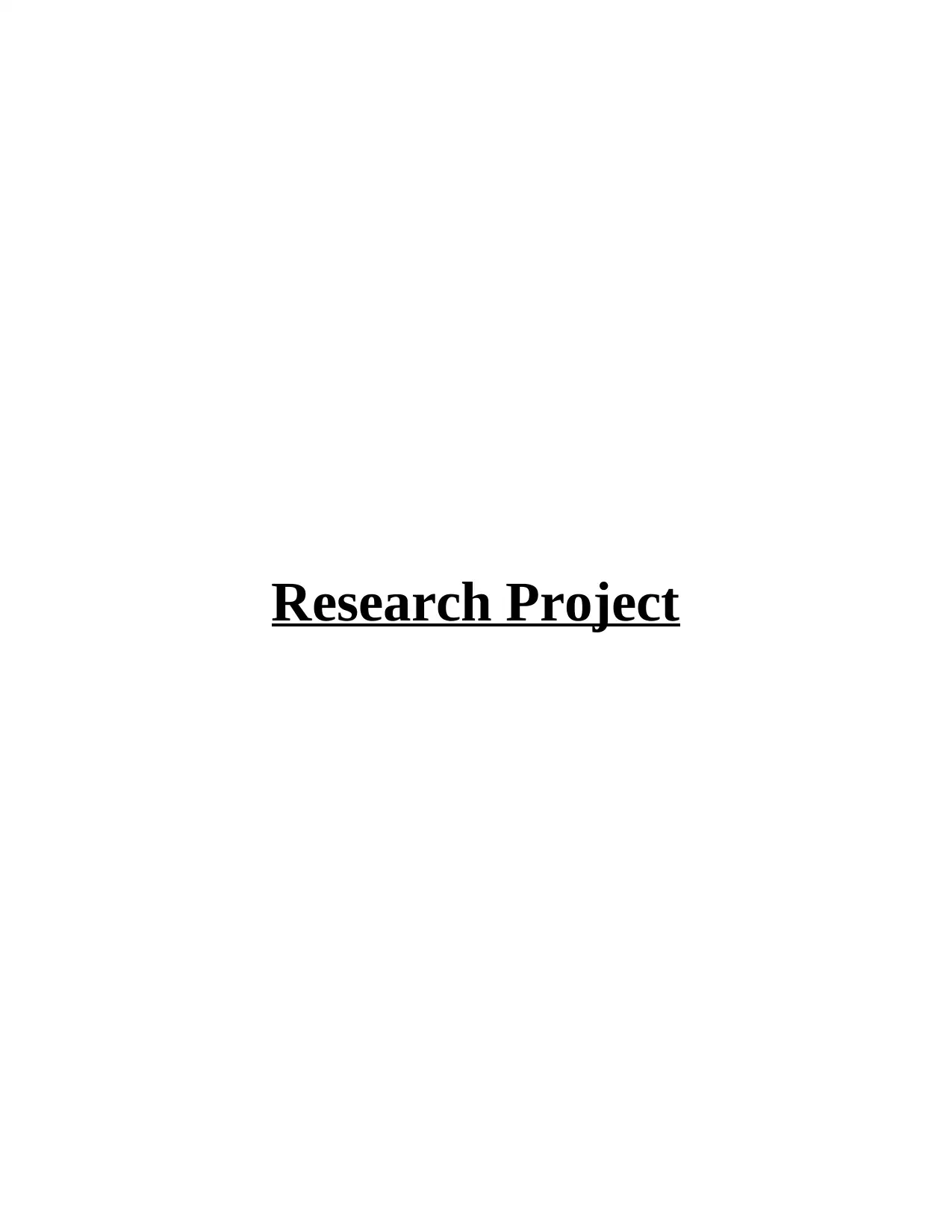
Research Project
Paraphrase This Document
Need a fresh take? Get an instant paraphrase of this document with our AI Paraphraser
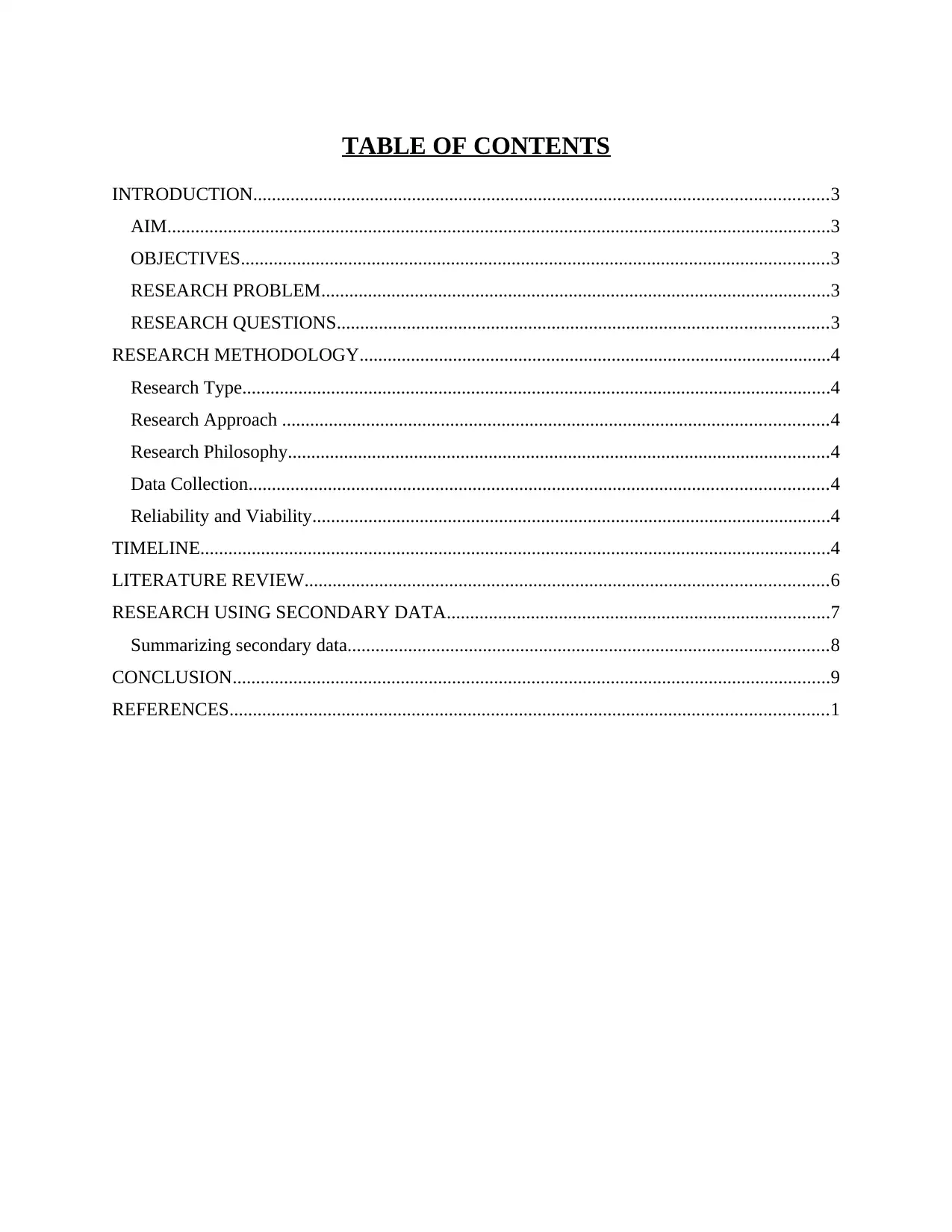
TABLE OF CONTENTS
INTRODUCTION...........................................................................................................................3
AIM..............................................................................................................................................3
OBJECTIVES..............................................................................................................................3
RESEARCH PROBLEM.............................................................................................................3
RESEARCH QUESTIONS.........................................................................................................3
RESEARCH METHODOLOGY.....................................................................................................4
Research Type..............................................................................................................................4
Research Approach .....................................................................................................................4
Research Philosophy....................................................................................................................4
Data Collection............................................................................................................................4
Reliability and Viability...............................................................................................................4
TIMELINE.......................................................................................................................................4
LITERATURE REVIEW................................................................................................................6
RESEARCH USING SECONDARY DATA..................................................................................7
Summarizing secondary data.......................................................................................................8
CONCLUSION................................................................................................................................9
REFERENCES................................................................................................................................1
INTRODUCTION...........................................................................................................................3
AIM..............................................................................................................................................3
OBJECTIVES..............................................................................................................................3
RESEARCH PROBLEM.............................................................................................................3
RESEARCH QUESTIONS.........................................................................................................3
RESEARCH METHODOLOGY.....................................................................................................4
Research Type..............................................................................................................................4
Research Approach .....................................................................................................................4
Research Philosophy....................................................................................................................4
Data Collection............................................................................................................................4
Reliability and Viability...............................................................................................................4
TIMELINE.......................................................................................................................................4
LITERATURE REVIEW................................................................................................................6
RESEARCH USING SECONDARY DATA..................................................................................7
Summarizing secondary data.......................................................................................................8
CONCLUSION................................................................................................................................9
REFERENCES................................................................................................................................1
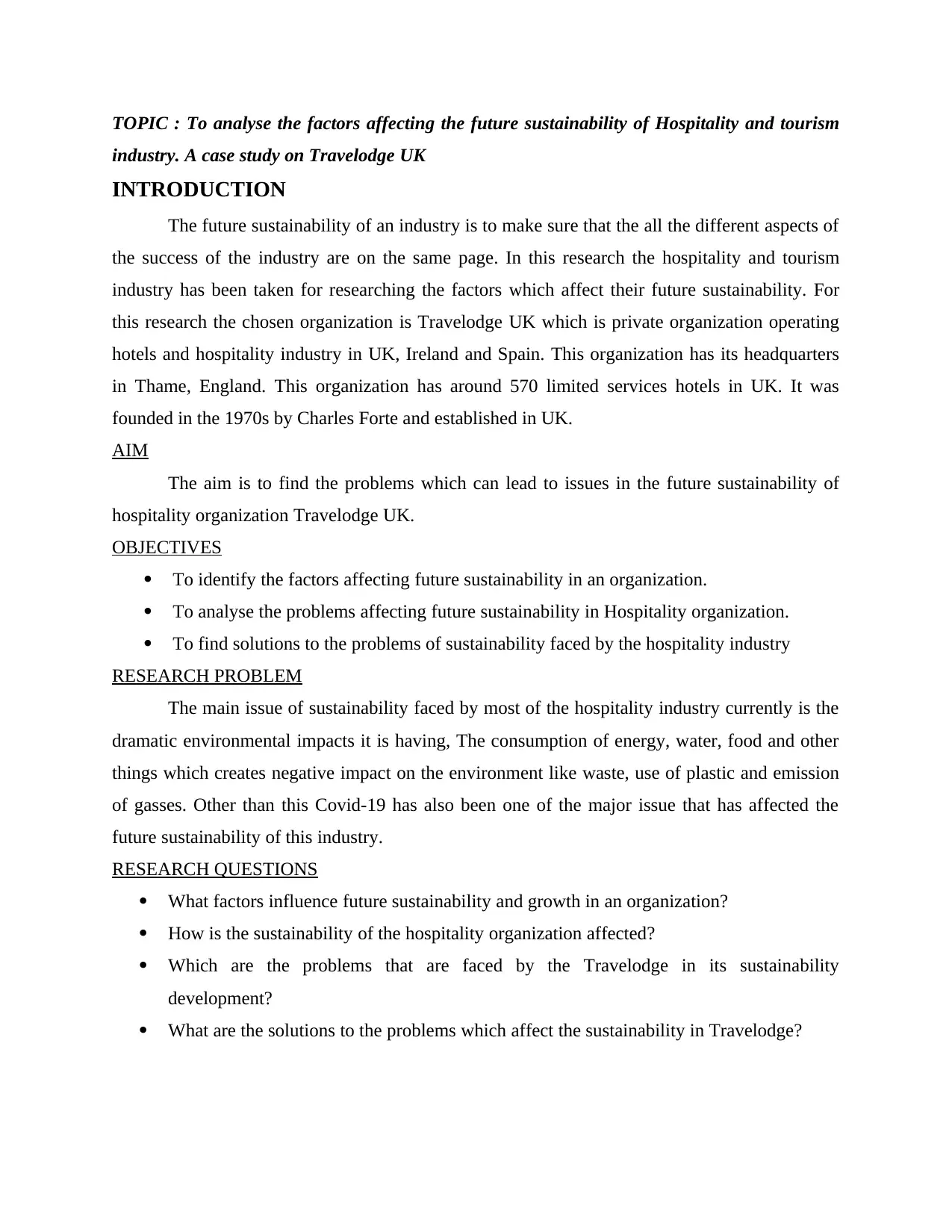
TOPIC : To analyse the factors affecting the future sustainability of Hospitality and tourism
industry. A case study on Travelodge UK
INTRODUCTION
The future sustainability of an industry is to make sure that the all the different aspects of
the success of the industry are on the same page. In this research the hospitality and tourism
industry has been taken for researching the factors which affect their future sustainability. For
this research the chosen organization is Travelodge UK which is private organization operating
hotels and hospitality industry in UK, Ireland and Spain. This organization has its headquarters
in Thame, England. This organization has around 570 limited services hotels in UK. It was
founded in the 1970s by Charles Forte and established in UK.
AIM
The aim is to find the problems which can lead to issues in the future sustainability of
hospitality organization Travelodge UK.
OBJECTIVES
To identify the factors affecting future sustainability in an organization.
To analyse the problems affecting future sustainability in Hospitality organization.
To find solutions to the problems of sustainability faced by the hospitality industry
RESEARCH PROBLEM
The main issue of sustainability faced by most of the hospitality industry currently is the
dramatic environmental impacts it is having, The consumption of energy, water, food and other
things which creates negative impact on the environment like waste, use of plastic and emission
of gasses. Other than this Covid-19 has also been one of the major issue that has affected the
future sustainability of this industry.
RESEARCH QUESTIONS
What factors influence future sustainability and growth in an organization?
How is the sustainability of the hospitality organization affected?
Which are the problems that are faced by the Travelodge in its sustainability
development?
What are the solutions to the problems which affect the sustainability in Travelodge?
industry. A case study on Travelodge UK
INTRODUCTION
The future sustainability of an industry is to make sure that the all the different aspects of
the success of the industry are on the same page. In this research the hospitality and tourism
industry has been taken for researching the factors which affect their future sustainability. For
this research the chosen organization is Travelodge UK which is private organization operating
hotels and hospitality industry in UK, Ireland and Spain. This organization has its headquarters
in Thame, England. This organization has around 570 limited services hotels in UK. It was
founded in the 1970s by Charles Forte and established in UK.
AIM
The aim is to find the problems which can lead to issues in the future sustainability of
hospitality organization Travelodge UK.
OBJECTIVES
To identify the factors affecting future sustainability in an organization.
To analyse the problems affecting future sustainability in Hospitality organization.
To find solutions to the problems of sustainability faced by the hospitality industry
RESEARCH PROBLEM
The main issue of sustainability faced by most of the hospitality industry currently is the
dramatic environmental impacts it is having, The consumption of energy, water, food and other
things which creates negative impact on the environment like waste, use of plastic and emission
of gasses. Other than this Covid-19 has also been one of the major issue that has affected the
future sustainability of this industry.
RESEARCH QUESTIONS
What factors influence future sustainability and growth in an organization?
How is the sustainability of the hospitality organization affected?
Which are the problems that are faced by the Travelodge in its sustainability
development?
What are the solutions to the problems which affect the sustainability in Travelodge?
⊘ This is a preview!⊘
Do you want full access?
Subscribe today to unlock all pages.

Trusted by 1+ million students worldwide
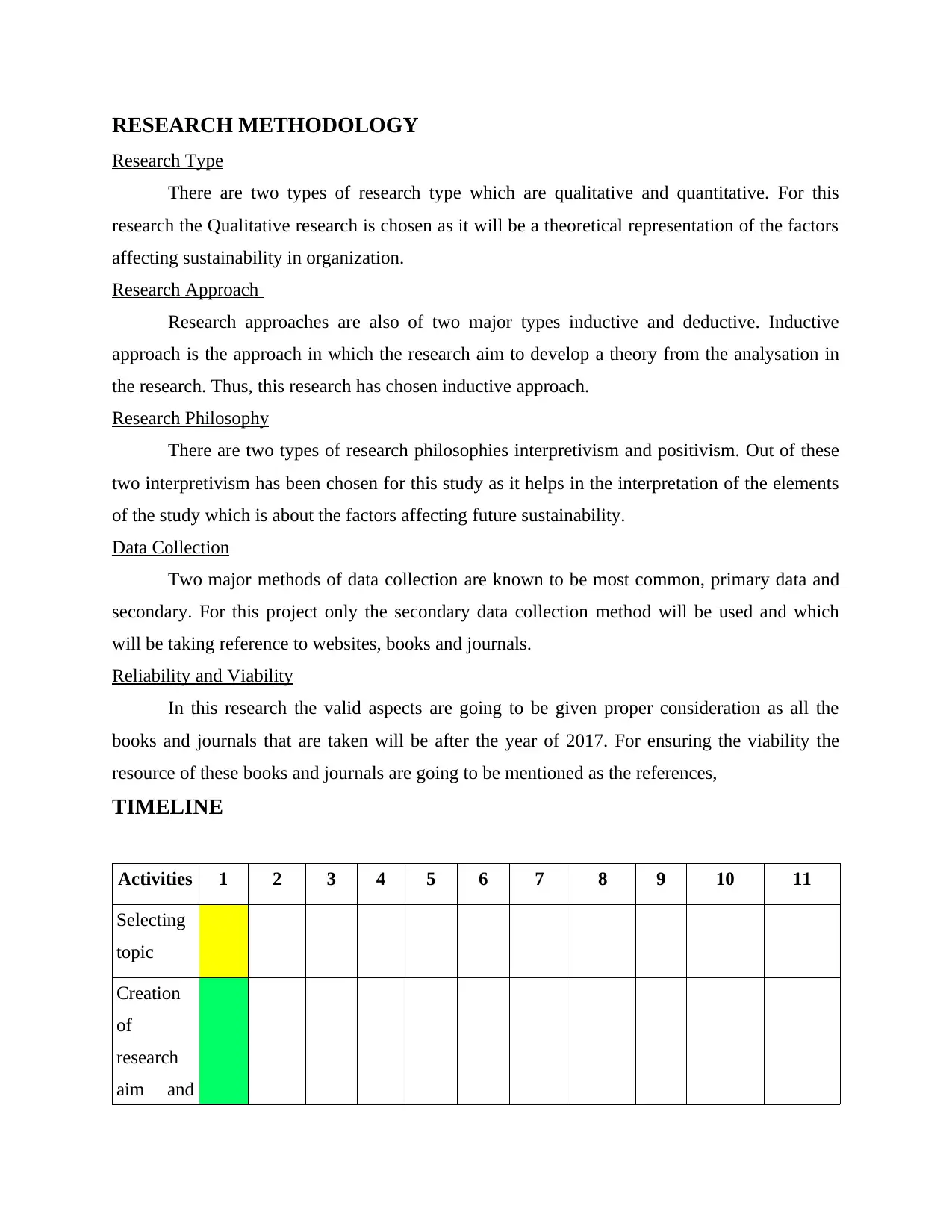
RESEARCH METHODOLOGY
Research Type
There are two types of research type which are qualitative and quantitative. For this
research the Qualitative research is chosen as it will be a theoretical representation of the factors
affecting sustainability in organization.
Research Approach
Research approaches are also of two major types inductive and deductive. Inductive
approach is the approach in which the research aim to develop a theory from the analysation in
the research. Thus, this research has chosen inductive approach.
Research Philosophy
There are two types of research philosophies interpretivism and positivism. Out of these
two interpretivism has been chosen for this study as it helps in the interpretation of the elements
of the study which is about the factors affecting future sustainability.
Data Collection
Two major methods of data collection are known to be most common, primary data and
secondary. For this project only the secondary data collection method will be used and which
will be taking reference to websites, books and journals.
Reliability and Viability
In this research the valid aspects are going to be given proper consideration as all the
books and journals that are taken will be after the year of 2017. For ensuring the viability the
resource of these books and journals are going to be mentioned as the references,
TIMELINE
Activities 1 2 3 4 5 6 7 8 9 10 11
Selecting
topic
Creation
of
research
aim and
Research Type
There are two types of research type which are qualitative and quantitative. For this
research the Qualitative research is chosen as it will be a theoretical representation of the factors
affecting sustainability in organization.
Research Approach
Research approaches are also of two major types inductive and deductive. Inductive
approach is the approach in which the research aim to develop a theory from the analysation in
the research. Thus, this research has chosen inductive approach.
Research Philosophy
There are two types of research philosophies interpretivism and positivism. Out of these
two interpretivism has been chosen for this study as it helps in the interpretation of the elements
of the study which is about the factors affecting future sustainability.
Data Collection
Two major methods of data collection are known to be most common, primary data and
secondary. For this project only the secondary data collection method will be used and which
will be taking reference to websites, books and journals.
Reliability and Viability
In this research the valid aspects are going to be given proper consideration as all the
books and journals that are taken will be after the year of 2017. For ensuring the viability the
resource of these books and journals are going to be mentioned as the references,
TIMELINE
Activities 1 2 3 4 5 6 7 8 9 10 11
Selecting
topic
Creation
of
research
aim and
Paraphrase This Document
Need a fresh take? Get an instant paraphrase of this document with our AI Paraphraser
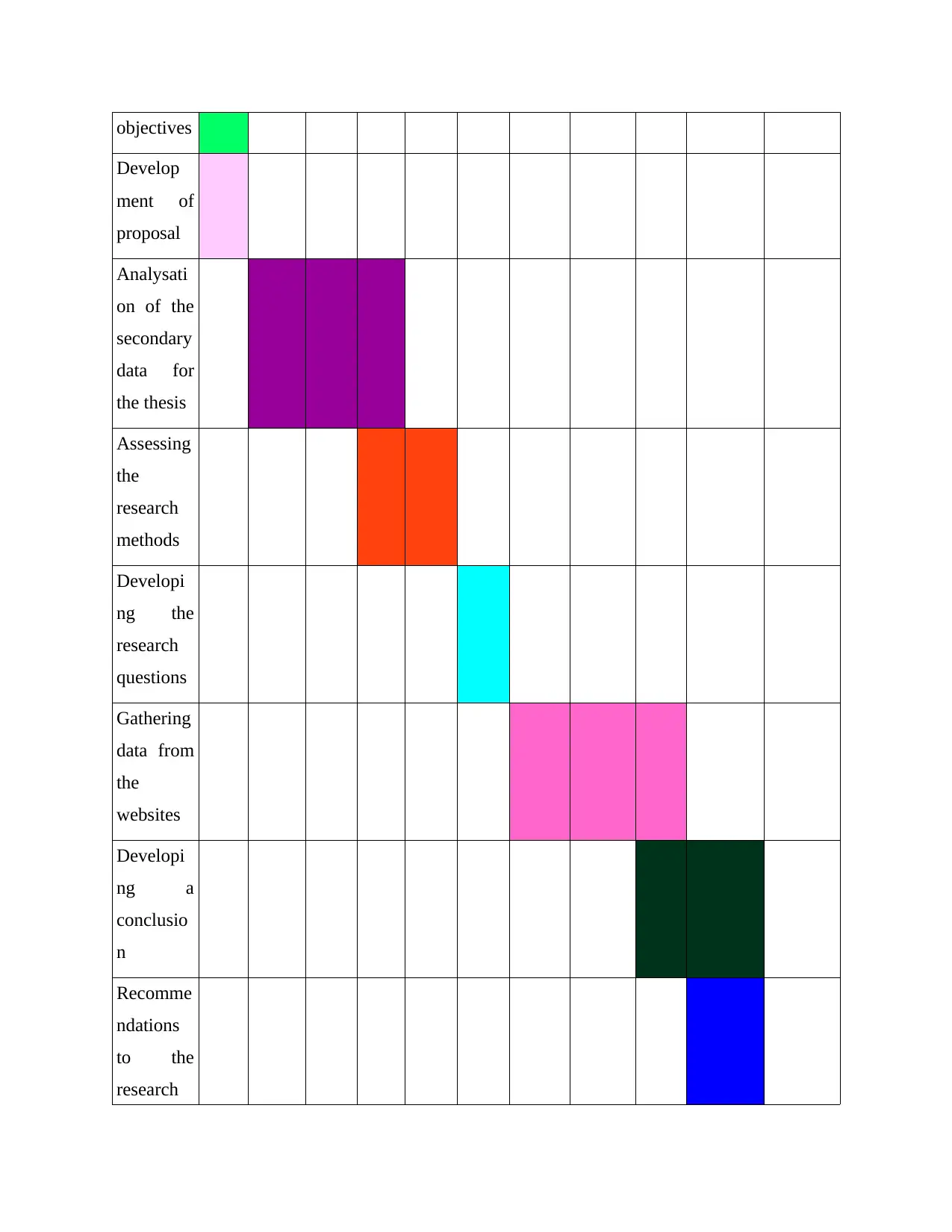
objectives
Develop
ment of
proposal
Analysati
on of the
secondary
data for
the thesis
Assessing
the
research
methods
Developi
ng the
research
questions
Gathering
data from
the
websites
Developi
ng a
conclusio
n
Recomme
ndations
to the
research
Develop
ment of
proposal
Analysati
on of the
secondary
data for
the thesis
Assessing
the
research
methods
Developi
ng the
research
questions
Gathering
data from
the
websites
Developi
ng a
conclusio
n
Recomme
ndations
to the
research
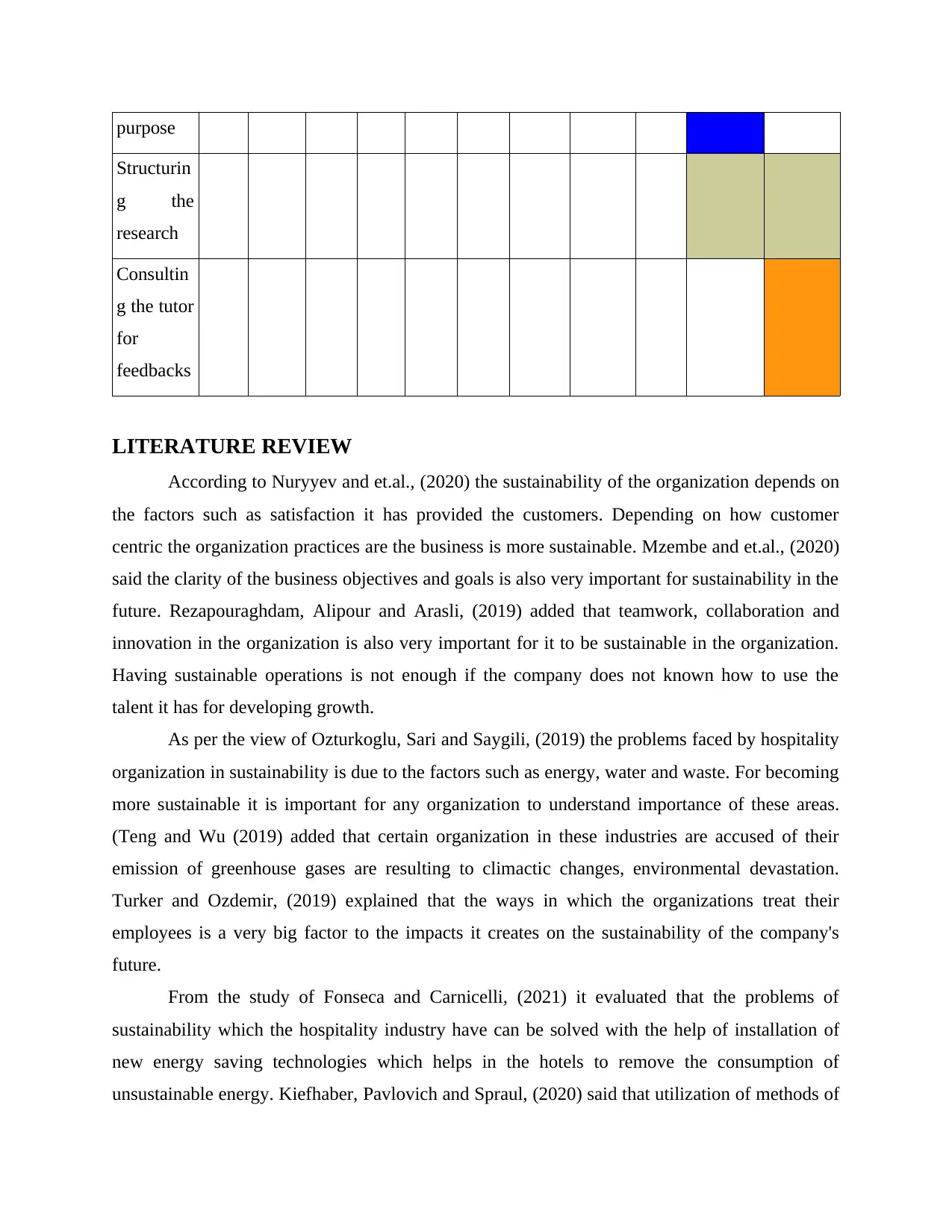
purpose
Structurin
g the
research
Consultin
g the tutor
for
feedbacks
LITERATURE REVIEW
According to Nuryyev and et.al., (2020) the sustainability of the organization depends on
the factors such as satisfaction it has provided the customers. Depending on how customer
centric the organization practices are the business is more sustainable. Mzembe and et.al., (2020)
said the clarity of the business objectives and goals is also very important for sustainability in the
future. Rezapouraghdam, Alipour and Arasli, (2019) added that teamwork, collaboration and
innovation in the organization is also very important for it to be sustainable in the organization.
Having sustainable operations is not enough if the company does not known how to use the
talent it has for developing growth.
As per the view of Ozturkoglu, Sari and Saygili, (2019) the problems faced by hospitality
organization in sustainability is due to the factors such as energy, water and waste. For becoming
more sustainable it is important for any organization to understand importance of these areas.
(Teng and Wu (2019) added that certain organization in these industries are accused of their
emission of greenhouse gases are resulting to climactic changes, environmental devastation.
Turker and Ozdemir, (2019) explained that the ways in which the organizations treat their
employees is a very big factor to the impacts it creates on the sustainability of the company's
future.
From the study of Fonseca and Carnicelli, (2021) it evaluated that the problems of
sustainability which the hospitality industry have can be solved with the help of installation of
new energy saving technologies which helps in the hotels to remove the consumption of
unsustainable energy. Kiefhaber, Pavlovich and Spraul, (2020) said that utilization of methods of
Structurin
g the
research
Consultin
g the tutor
for
feedbacks
LITERATURE REVIEW
According to Nuryyev and et.al., (2020) the sustainability of the organization depends on
the factors such as satisfaction it has provided the customers. Depending on how customer
centric the organization practices are the business is more sustainable. Mzembe and et.al., (2020)
said the clarity of the business objectives and goals is also very important for sustainability in the
future. Rezapouraghdam, Alipour and Arasli, (2019) added that teamwork, collaboration and
innovation in the organization is also very important for it to be sustainable in the organization.
Having sustainable operations is not enough if the company does not known how to use the
talent it has for developing growth.
As per the view of Ozturkoglu, Sari and Saygili, (2019) the problems faced by hospitality
organization in sustainability is due to the factors such as energy, water and waste. For becoming
more sustainable it is important for any organization to understand importance of these areas.
(Teng and Wu (2019) added that certain organization in these industries are accused of their
emission of greenhouse gases are resulting to climactic changes, environmental devastation.
Turker and Ozdemir, (2019) explained that the ways in which the organizations treat their
employees is a very big factor to the impacts it creates on the sustainability of the company's
future.
From the study of Fonseca and Carnicelli, (2021) it evaluated that the problems of
sustainability which the hospitality industry have can be solved with the help of installation of
new energy saving technologies which helps in the hotels to remove the consumption of
unsustainable energy. Kiefhaber, Pavlovich and Spraul, (2020) said that utilization of methods of
⊘ This is a preview!⊘
Do you want full access?
Subscribe today to unlock all pages.

Trusted by 1+ million students worldwide
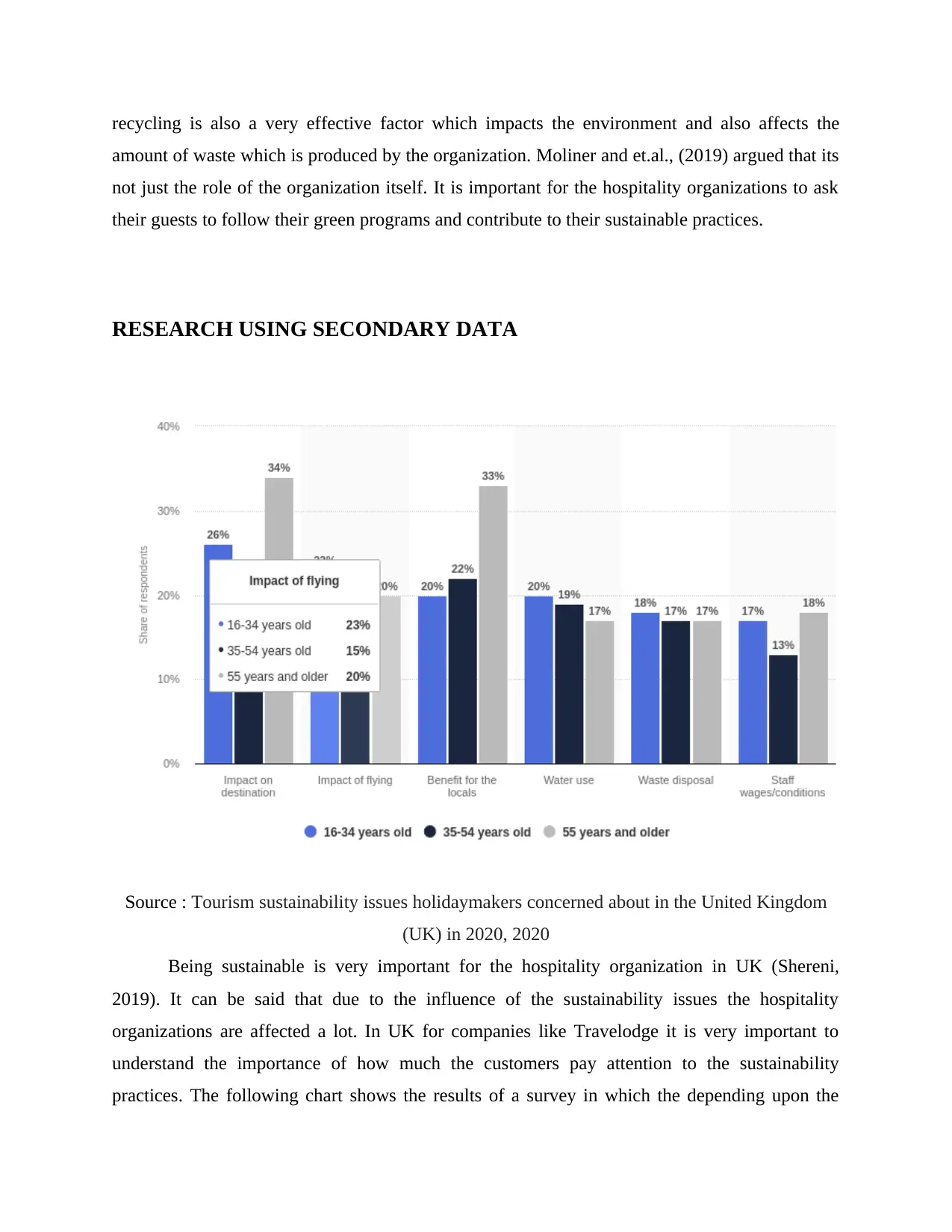
recycling is also a very effective factor which impacts the environment and also affects the
amount of waste which is produced by the organization. Moliner and et.al., (2019) argued that its
not just the role of the organization itself. It is important for the hospitality organizations to ask
their guests to follow their green programs and contribute to their sustainable practices.
RESEARCH USING SECONDARY DATA
Source : Tourism sustainability issues holidaymakers concerned about in the United Kingdom
(UK) in 2020, 2020
Being sustainable is very important for the hospitality organization in UK (Shereni,
2019). It can be said that due to the influence of the sustainability issues the hospitality
organizations are affected a lot. In UK for companies like Travelodge it is very important to
understand the importance of how much the customers pay attention to the sustainability
practices. The following chart shows the results of a survey in which the depending upon the
amount of waste which is produced by the organization. Moliner and et.al., (2019) argued that its
not just the role of the organization itself. It is important for the hospitality organizations to ask
their guests to follow their green programs and contribute to their sustainable practices.
RESEARCH USING SECONDARY DATA
Source : Tourism sustainability issues holidaymakers concerned about in the United Kingdom
(UK) in 2020, 2020
Being sustainable is very important for the hospitality organization in UK (Shereni,
2019). It can be said that due to the influence of the sustainability issues the hospitality
organizations are affected a lot. In UK for companies like Travelodge it is very important to
understand the importance of how much the customers pay attention to the sustainability
practices. The following chart shows the results of a survey in which the depending upon the
Paraphrase This Document
Need a fresh take? Get an instant paraphrase of this document with our AI Paraphraser
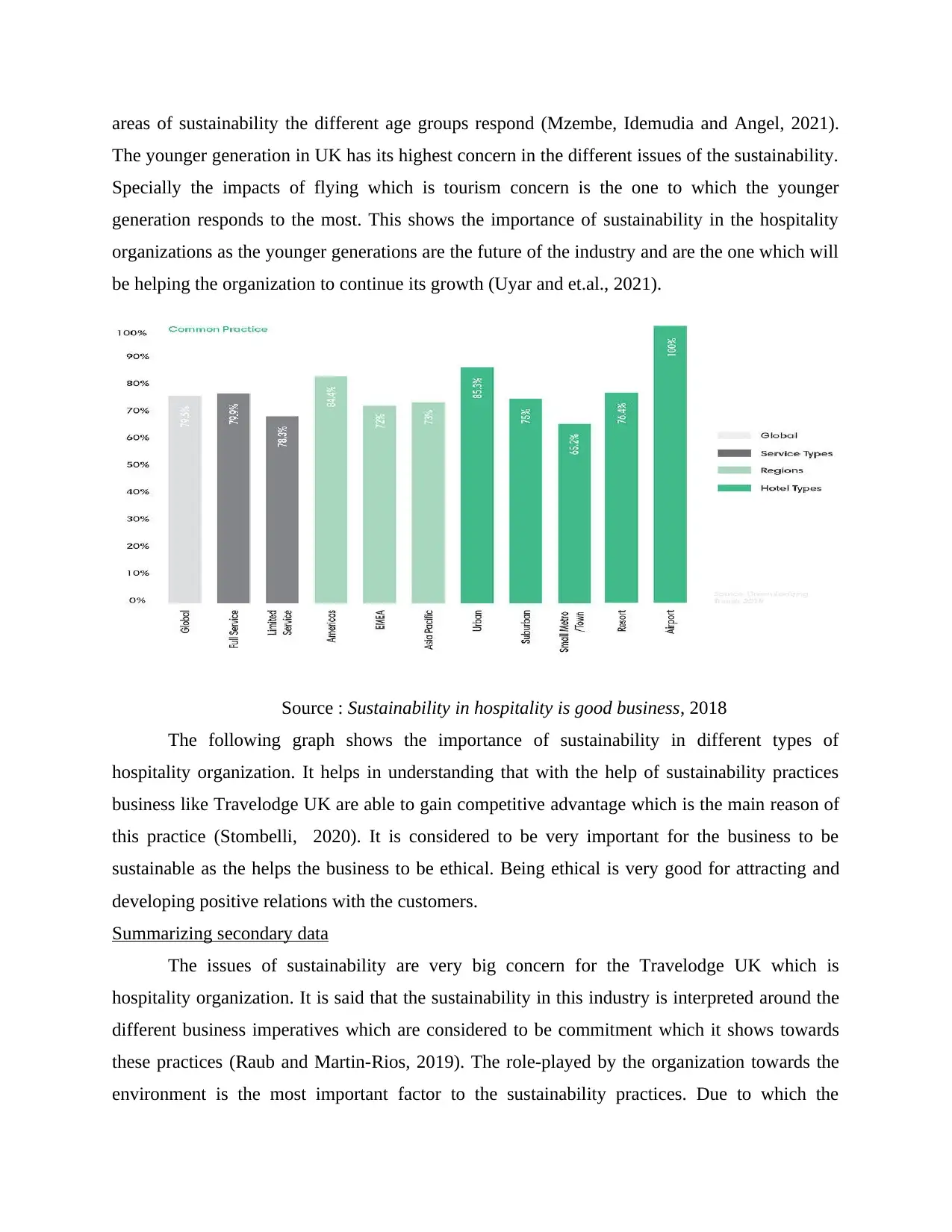
areas of sustainability the different age groups respond (Mzembe, Idemudia and Angel, 2021).
The younger generation in UK has its highest concern in the different issues of the sustainability.
Specially the impacts of flying which is tourism concern is the one to which the younger
generation responds to the most. This shows the importance of sustainability in the hospitality
organizations as the younger generations are the future of the industry and are the one which will
be helping the organization to continue its growth (Uyar and et.al., 2021).
Source : Sustainability in hospitality is good business, 2018
The following graph shows the importance of sustainability in different types of
hospitality organization. It helps in understanding that with the help of sustainability practices
business like Travelodge UK are able to gain competitive advantage which is the main reason of
this practice (Stombelli, 2020). It is considered to be very important for the business to be
sustainable as the helps the business to be ethical. Being ethical is very good for attracting and
developing positive relations with the customers.
Summarizing secondary data
The issues of sustainability are very big concern for the Travelodge UK which is
hospitality organization. It is said that the sustainability in this industry is interpreted around the
different business imperatives which are considered to be commitment which it shows towards
these practices (Raub and Martin-Rios, 2019). The role-played by the organization towards the
environment is the most important factor to the sustainability practices. Due to which the
The younger generation in UK has its highest concern in the different issues of the sustainability.
Specially the impacts of flying which is tourism concern is the one to which the younger
generation responds to the most. This shows the importance of sustainability in the hospitality
organizations as the younger generations are the future of the industry and are the one which will
be helping the organization to continue its growth (Uyar and et.al., 2021).
Source : Sustainability in hospitality is good business, 2018
The following graph shows the importance of sustainability in different types of
hospitality organization. It helps in understanding that with the help of sustainability practices
business like Travelodge UK are able to gain competitive advantage which is the main reason of
this practice (Stombelli, 2020). It is considered to be very important for the business to be
sustainable as the helps the business to be ethical. Being ethical is very good for attracting and
developing positive relations with the customers.
Summarizing secondary data
The issues of sustainability are very big concern for the Travelodge UK which is
hospitality organization. It is said that the sustainability in this industry is interpreted around the
different business imperatives which are considered to be commitment which it shows towards
these practices (Raub and Martin-Rios, 2019). The role-played by the organization towards the
environment is the most important factor to the sustainability practices. Due to which the
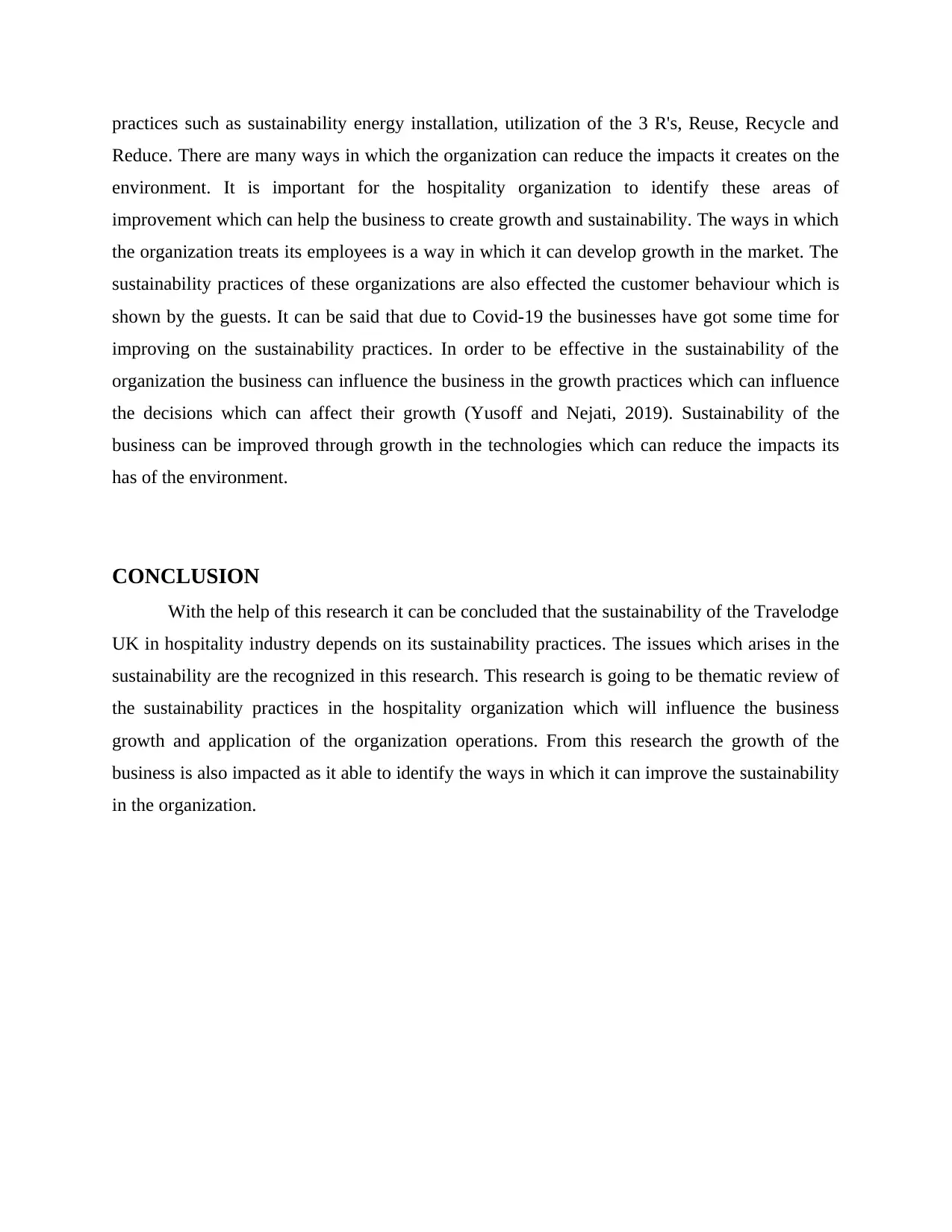
practices such as sustainability energy installation, utilization of the 3 R's, Reuse, Recycle and
Reduce. There are many ways in which the organization can reduce the impacts it creates on the
environment. It is important for the hospitality organization to identify these areas of
improvement which can help the business to create growth and sustainability. The ways in which
the organization treats its employees is a way in which it can develop growth in the market. The
sustainability practices of these organizations are also effected the customer behaviour which is
shown by the guests. It can be said that due to Covid-19 the businesses have got some time for
improving on the sustainability practices. In order to be effective in the sustainability of the
organization the business can influence the business in the growth practices which can influence
the decisions which can affect their growth (Yusoff and Nejati, 2019). Sustainability of the
business can be improved through growth in the technologies which can reduce the impacts its
has of the environment.
CONCLUSION
With the help of this research it can be concluded that the sustainability of the Travelodge
UK in hospitality industry depends on its sustainability practices. The issues which arises in the
sustainability are the recognized in this research. This research is going to be thematic review of
the sustainability practices in the hospitality organization which will influence the business
growth and application of the organization operations. From this research the growth of the
business is also impacted as it able to identify the ways in which it can improve the sustainability
in the organization.
Reduce. There are many ways in which the organization can reduce the impacts it creates on the
environment. It is important for the hospitality organization to identify these areas of
improvement which can help the business to create growth and sustainability. The ways in which
the organization treats its employees is a way in which it can develop growth in the market. The
sustainability practices of these organizations are also effected the customer behaviour which is
shown by the guests. It can be said that due to Covid-19 the businesses have got some time for
improving on the sustainability practices. In order to be effective in the sustainability of the
organization the business can influence the business in the growth practices which can influence
the decisions which can affect their growth (Yusoff and Nejati, 2019). Sustainability of the
business can be improved through growth in the technologies which can reduce the impacts its
has of the environment.
CONCLUSION
With the help of this research it can be concluded that the sustainability of the Travelodge
UK in hospitality industry depends on its sustainability practices. The issues which arises in the
sustainability are the recognized in this research. This research is going to be thematic review of
the sustainability practices in the hospitality organization which will influence the business
growth and application of the organization operations. From this research the growth of the
business is also impacted as it able to identify the ways in which it can improve the sustainability
in the organization.
⊘ This is a preview!⊘
Do you want full access?
Subscribe today to unlock all pages.

Trusted by 1+ million students worldwide
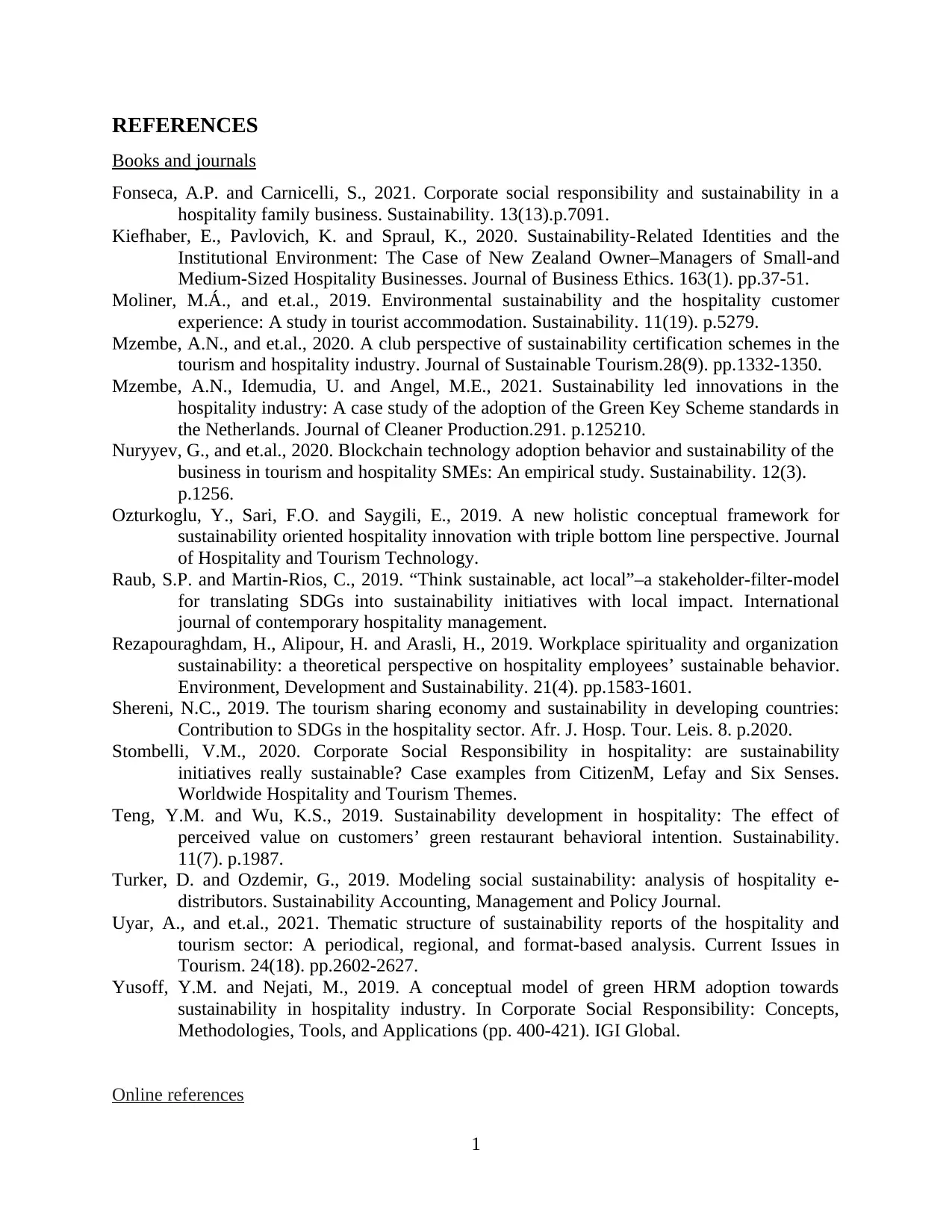
REFERENCES
Books and journals
Fonseca, A.P. and Carnicelli, S., 2021. Corporate social responsibility and sustainability in a
hospitality family business. Sustainability. 13(13).p.7091.
Kiefhaber, E., Pavlovich, K. and Spraul, K., 2020. Sustainability-Related Identities and the
Institutional Environment: The Case of New Zealand Owner–Managers of Small-and
Medium-Sized Hospitality Businesses. Journal of Business Ethics. 163(1). pp.37-51.
Moliner, M.Á., and et.al., 2019. Environmental sustainability and the hospitality customer
experience: A study in tourist accommodation. Sustainability. 11(19). p.5279.
Mzembe, A.N., and et.al., 2020. A club perspective of sustainability certification schemes in the
tourism and hospitality industry. Journal of Sustainable Tourism.28(9). pp.1332-1350.
Mzembe, A.N., Idemudia, U. and Angel, M.E., 2021. Sustainability led innovations in the
hospitality industry: A case study of the adoption of the Green Key Scheme standards in
the Netherlands. Journal of Cleaner Production.291. p.125210.
Nuryyev, G., and et.al., 2020. Blockchain technology adoption behavior and sustainability of the
business in tourism and hospitality SMEs: An empirical study. Sustainability. 12(3).
p.1256.
Ozturkoglu, Y., Sari, F.O. and Saygili, E., 2019. A new holistic conceptual framework for
sustainability oriented hospitality innovation with triple bottom line perspective. Journal
of Hospitality and Tourism Technology.
Raub, S.P. and Martin-Rios, C., 2019. “Think sustainable, act local”–a stakeholder-filter-model
for translating SDGs into sustainability initiatives with local impact. International
journal of contemporary hospitality management.
Rezapouraghdam, H., Alipour, H. and Arasli, H., 2019. Workplace spirituality and organization
sustainability: a theoretical perspective on hospitality employees’ sustainable behavior.
Environment, Development and Sustainability. 21(4). pp.1583-1601.
Shereni, N.C., 2019. The tourism sharing economy and sustainability in developing countries:
Contribution to SDGs in the hospitality sector. Afr. J. Hosp. Tour. Leis. 8. p.2020.
Stombelli, V.M., 2020. Corporate Social Responsibility in hospitality: are sustainability
initiatives really sustainable? Case examples from CitizenM, Lefay and Six Senses.
Worldwide Hospitality and Tourism Themes.
Teng, Y.M. and Wu, K.S., 2019. Sustainability development in hospitality: The effect of
perceived value on customers’ green restaurant behavioral intention. Sustainability.
11(7). p.1987.
Turker, D. and Ozdemir, G., 2019. Modeling social sustainability: analysis of hospitality e-
distributors. Sustainability Accounting, Management and Policy Journal.
Uyar, A., and et.al., 2021. Thematic structure of sustainability reports of the hospitality and
tourism sector: A periodical, regional, and format-based analysis. Current Issues in
Tourism. 24(18). pp.2602-2627.
Yusoff, Y.M. and Nejati, M., 2019. A conceptual model of green HRM adoption towards
sustainability in hospitality industry. In Corporate Social Responsibility: Concepts,
Methodologies, Tools, and Applications (pp. 400-421). IGI Global.
Online references
1
Books and journals
Fonseca, A.P. and Carnicelli, S., 2021. Corporate social responsibility and sustainability in a
hospitality family business. Sustainability. 13(13).p.7091.
Kiefhaber, E., Pavlovich, K. and Spraul, K., 2020. Sustainability-Related Identities and the
Institutional Environment: The Case of New Zealand Owner–Managers of Small-and
Medium-Sized Hospitality Businesses. Journal of Business Ethics. 163(1). pp.37-51.
Moliner, M.Á., and et.al., 2019. Environmental sustainability and the hospitality customer
experience: A study in tourist accommodation. Sustainability. 11(19). p.5279.
Mzembe, A.N., and et.al., 2020. A club perspective of sustainability certification schemes in the
tourism and hospitality industry. Journal of Sustainable Tourism.28(9). pp.1332-1350.
Mzembe, A.N., Idemudia, U. and Angel, M.E., 2021. Sustainability led innovations in the
hospitality industry: A case study of the adoption of the Green Key Scheme standards in
the Netherlands. Journal of Cleaner Production.291. p.125210.
Nuryyev, G., and et.al., 2020. Blockchain technology adoption behavior and sustainability of the
business in tourism and hospitality SMEs: An empirical study. Sustainability. 12(3).
p.1256.
Ozturkoglu, Y., Sari, F.O. and Saygili, E., 2019. A new holistic conceptual framework for
sustainability oriented hospitality innovation with triple bottom line perspective. Journal
of Hospitality and Tourism Technology.
Raub, S.P. and Martin-Rios, C., 2019. “Think sustainable, act local”–a stakeholder-filter-model
for translating SDGs into sustainability initiatives with local impact. International
journal of contemporary hospitality management.
Rezapouraghdam, H., Alipour, H. and Arasli, H., 2019. Workplace spirituality and organization
sustainability: a theoretical perspective on hospitality employees’ sustainable behavior.
Environment, Development and Sustainability. 21(4). pp.1583-1601.
Shereni, N.C., 2019. The tourism sharing economy and sustainability in developing countries:
Contribution to SDGs in the hospitality sector. Afr. J. Hosp. Tour. Leis. 8. p.2020.
Stombelli, V.M., 2020. Corporate Social Responsibility in hospitality: are sustainability
initiatives really sustainable? Case examples from CitizenM, Lefay and Six Senses.
Worldwide Hospitality and Tourism Themes.
Teng, Y.M. and Wu, K.S., 2019. Sustainability development in hospitality: The effect of
perceived value on customers’ green restaurant behavioral intention. Sustainability.
11(7). p.1987.
Turker, D. and Ozdemir, G., 2019. Modeling social sustainability: analysis of hospitality e-
distributors. Sustainability Accounting, Management and Policy Journal.
Uyar, A., and et.al., 2021. Thematic structure of sustainability reports of the hospitality and
tourism sector: A periodical, regional, and format-based analysis. Current Issues in
Tourism. 24(18). pp.2602-2627.
Yusoff, Y.M. and Nejati, M., 2019. A conceptual model of green HRM adoption towards
sustainability in hospitality industry. In Corporate Social Responsibility: Concepts,
Methodologies, Tools, and Applications (pp. 400-421). IGI Global.
Online references
1
Paraphrase This Document
Need a fresh take? Get an instant paraphrase of this document with our AI Paraphraser
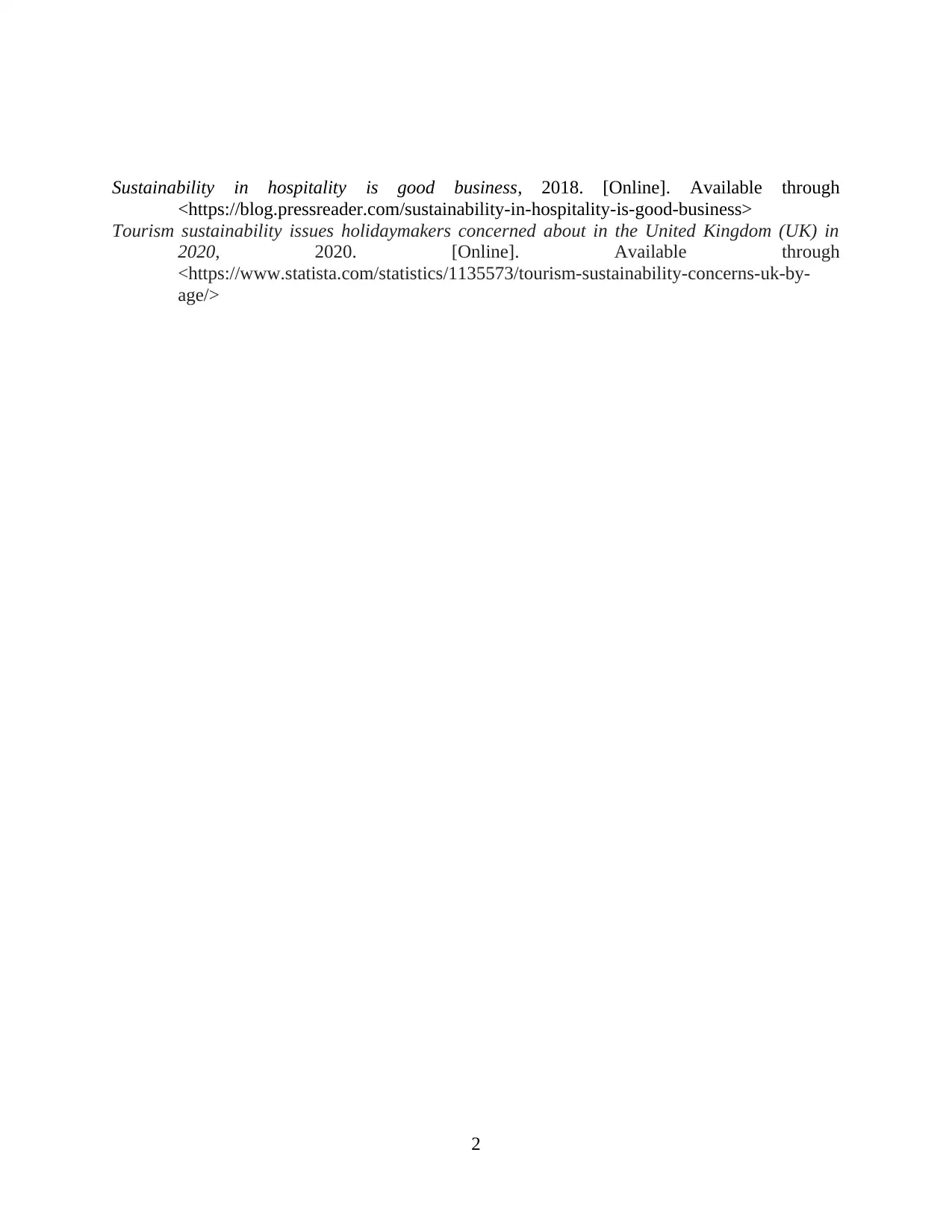
Sustainability in hospitality is good business, 2018. [Online]. Available through
<https://blog.pressreader.com/sustainability-in-hospitality-is-good-business>
Tourism sustainability issues holidaymakers concerned about in the United Kingdom (UK) in
2020, 2020. [Online]. Available through
<https://www.statista.com/statistics/1135573/tourism-sustainability-concerns-uk-by-
age/>
2
<https://blog.pressreader.com/sustainability-in-hospitality-is-good-business>
Tourism sustainability issues holidaymakers concerned about in the United Kingdom (UK) in
2020, 2020. [Online]. Available through
<https://www.statista.com/statistics/1135573/tourism-sustainability-concerns-uk-by-
age/>
2
1 out of 11
Related Documents
Your All-in-One AI-Powered Toolkit for Academic Success.
+13062052269
info@desklib.com
Available 24*7 on WhatsApp / Email
![[object Object]](/_next/static/media/star-bottom.7253800d.svg)
Unlock your academic potential
Copyright © 2020–2025 A2Z Services. All Rights Reserved. Developed and managed by ZUCOL.





